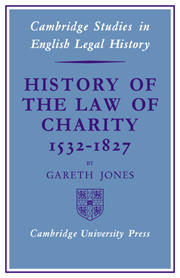Book contents
- Frontmatter
- Contents
- Preface
- List of Abbreviations
- Table Of Statutes
- Table Of Cases
- THE DEVELOPMENT OF THE LAW OF CHARITY 1532–1700
- THE DEVELOPMENT OF THE LAW OF CHARITY 1700–1827
- Appendixes
- Appendix A Bills and Answers in Chancery relating to Charity, 1350–1601
- Appendix B Selected Transcriptions
- Appendix C The Charitable Uses Act, 1597: 39 Elizabeth I c. 6
- Appendix D The Charitable Uses Act, 1601: 43 Elizabeth I c. 4
- Appendix E A Bibliographical note on the Cambridge MS. of Francis Moore's Reading on the Statute of Charitable Uses: 43 Elizabeth I c. 4
- Appendix F Francis Moore's Notes and his Speech at the Beginninge
- Appendix G A Case from Francis Moore's Reading
- Appendix H Inquisitions before the Charity Commissioners: 1597–1787
- Appendix I Decrees made by the Charity Commissioners: 1597–1787
- Appendix J The Mortmain Act, 1736: 9 George II c. 36
- Appendix K The Poor Relation Cases
- Index
Appendix J - The Mortmain Act, 1736: 9 George II c. 36
Published online by Cambridge University Press: 07 October 2011
- Frontmatter
- Contents
- Preface
- List of Abbreviations
- Table Of Statutes
- Table Of Cases
- THE DEVELOPMENT OF THE LAW OF CHARITY 1532–1700
- THE DEVELOPMENT OF THE LAW OF CHARITY 1700–1827
- Appendixes
- Appendix A Bills and Answers in Chancery relating to Charity, 1350–1601
- Appendix B Selected Transcriptions
- Appendix C The Charitable Uses Act, 1597: 39 Elizabeth I c. 6
- Appendix D The Charitable Uses Act, 1601: 43 Elizabeth I c. 4
- Appendix E A Bibliographical note on the Cambridge MS. of Francis Moore's Reading on the Statute of Charitable Uses: 43 Elizabeth I c. 4
- Appendix F Francis Moore's Notes and his Speech at the Beginninge
- Appendix G A Case from Francis Moore's Reading
- Appendix H Inquisitions before the Charity Commissioners: 1597–1787
- Appendix I Decrees made by the Charity Commissioners: 1597–1787
- Appendix J The Mortmain Act, 1736: 9 George II c. 36
- Appendix K The Poor Relation Cases
- Index
Summary
An act to restrain the disposition of lands, whereby the same become unalienable.
Whereas gifts or alienations of lands, tenements or hereditaments, in Mortmain, are prohibited or restrained by Magna Charta, and divers other wholsome laws, as prejudicial to and against the common utility; nevertheless this publick mischief has of late greatly increased by many large and improvident alienations or dispositions made by languishing or dying persons, or by other persons, to uses called Charitable uses, to take place after their deaths, to the dishersion of their lawful heirs; for remedy whereof be it enacted by the King's most excellent majesty, by and with the advice and consent of the lords spiritual and temporal, and commons, in this present parliament assembled, and by the authority of the same, That from and after the twenty fourth day of June, which shall be in the year of our Lord one thousand seven hundred and thirty six, no manors, lands, tenements, rents, advowsons, or other hereditaments, corporeal or incorporeal, whatsoever, nor any sum or sums of money, goods, chattels, stocks in the publick funds, securities for money, or any other personal estate whatsoever, to be laid out or disposed of in the purchase of any lands, tenements, or hereditaments, shall be given, granted, aliened, limited, released, transferred, assigned, or appointed, or any ways conveyed or settled to or upon any person or persons, bodies politick or corporate, or otherwise, for any estate or interest whatsoever, or any ways charged or incumbered by any person or persons whatsoever, in trust, or for the benefit of any charitable uses whatsoever.
- Type
- Chapter
- Information
- History of the Law of Charity, 1532-1827 , pp. 257 - 259Publisher: Cambridge University PressPrint publication year: 1969



